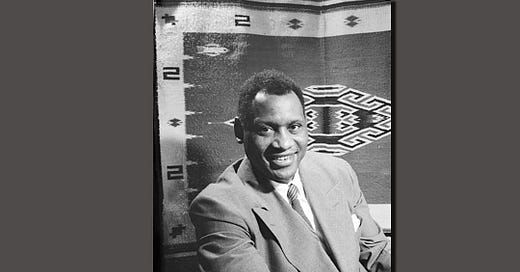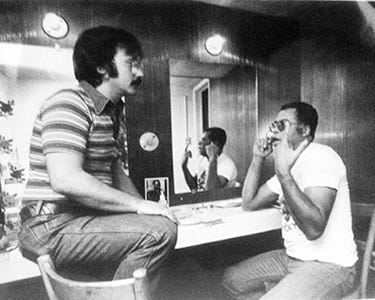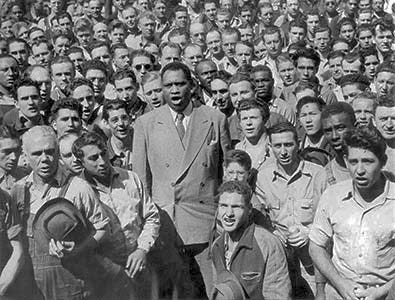James Earl Jones as Paul Robeson- Updated and Expanded, Part 2
More information and including a YouTube video of the Paul Robeson performance by Mr. Jones and video of the Robeson Peekskill riot information.
(This is Part 2, Read Part 1 Here)
My wife joined us in Chicago. What started out as a visit wound up being a position on the show's crew. So many changes were happening they needed a regular typist. Christine was an excellent typist, and she volunteered, but it wound up with a paying job for the rest of the tour.
The crew was great to work with and excellent fun during off hours. A nice camaraderie developed. The amount of flying got to be a bore though so we were all very excited when we finally arrived back in the city.
On opening night, Phil Stein, who was an experienced Broadway stage manager, had to go back to Los Angeles on personal business, which left me alone to run the show. First Broadway show and all by myself, opening night, with no backup. It’s true, I was just a little nervous.
Just before opening night, a letter signed by 56 writers, artists and politicians — among them Alvin Ailey, Maya Angelou, James Baldwin, Charles Rangel, Coretta Scott King, Julian Bond and Robeson’s son, Paul Jr., who appeared to be the leader of the protest— appeared as a paid advertisement in Variety.
That shocked everyone on the cast and crew was really taken aback by that. Phillip Hayes Dean was especially upset, so much so he never wrote another play.
As stage manager, I ultimately saw the show including pre-Broadway performances over 120 times, and I can tell you, from my limited viewpoint, it in no way shortchanged the life of Paul Robeson. The performance was powerful and despite it being a one-man show lasting almost two hours, the audienes were rapt with attention by his powerful voice and delivery.
It was detailed and complex and full of admiration for the man. My personal take on it was that the Robeson family was annoyed or insulted that they really had no say in the development of the show. Families of famous personalities can get very possessive of a legacy. But then again, what do I know.
Paul Robeson achieved international fame in the 1930s and 1940s as an actor and singer, starring in Show Boat and a version of Othello that set a record for the longest-running production of a Shakespeare play on Broadway.
But he achieved even more fame—or notoriety—as an activist, traveling the world to speak out against fascism, African colonialism, U.S. racism, and the Cold War.
In material drawn from Robeson’s autobiography and letters, Jones encapsulates the icon’s beliefs in scientific socialism, peace, and a vision of racial unity. As a result, he was virtually blacklisted from the entertainment industry. His passport was revoked and his concerts were canceled. His dazzling career was shattered.
Above a video of the famous Peekskill riot where right wing protesters attacked the crowd.
Only towards the end of his life did he resume public appearances and his fame began to revive. His right to travel was eventually restored by the 1958 United States Supreme Court decision, Kent v. Dulles, but his health broke down. He retired and he lived out the remaining years of his life privately in Philadelphia. He died in 1976.
Jones channels him in a two-hour, two-act play conceived as Robeson talking to the audience at an awards show as he was being honored at Carnegie Hall at age 75.
It was an event he did not attend, due to ill health and lingering bitterness over his treatment in the U.S, so we hear what Robeson might have been thinking as he watches his own enshrinement. He reviews his life experiences through stories, reenacted , and songs. (from Wikipedia)
A good synopsis and historical perspective on James Earl Jones' Paul Robeson is at a Paul Robeson Review if you have an interest.
On stage with James Earl was Burt Wallace, a lean, long fingered, Haitian American and superb pianist who provided the musical transitions and created moods on stage behind Mr. Jones riveting performances.
“Robeson” from the beginning was billed as limited run. A major snowstorm hit the City the night we opened on January 19th, 1978, which kept the audience small, but once we got passed that, we had excellent sized audiences.
After performances, backstage we got to meet the celebrities that came to visit Mr. Jones —Diana Ross, Michael Jackson, Muhammed Ali and many more that I won't list. Our run last seventy-seven performances.
Joe Papp's Shakespeare Festival immediately picked it up, and it ran in conjunction with Ntozake Shange's For Colored Girls Who Have Considered Suicide... at the Booth Theater on 46th Street for a short period, where I alternately stage managed both shows.
It was a big letdown once the show ended. Funny thing about a high-profile, showbiz job. While you're there, it seems you'll always be there, but once it ends, you have to start all over again.
A few months later Don Gregory called and asked me if I wanted to do another one-man show for him starring Richard Chamberlain with rehearsals starting in L.A.
I said sure. Since our lease was up on our loft, we decided not to renew. We packed up and drove to Los Angeles to begin the show. Once there, delays, delays, delays and ultimately Gregory canceled the show leaving us high and dry.
We headed home but once we returned, we couldn't get back into NYC. The rents had tripled in a few months from our original lease plus—surprise--we were having a baby. There wasn't much to do while we waited around in L.A. Bye, bye, Big Apple.
http://www.ibdb.com/production.php?id=4038 for imdb paul robeson show
http://www.popmatters.com/review/paul-robeson-dvd
https://en.wikipedia.org/wiki/Paul_Robeson
A good synopsis and historical perspective on James Earl Jones' Paul Robeson at http://www.popmatters.com/review/paul-robeson-dvd







